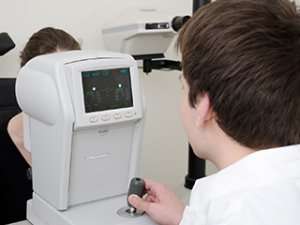(510) 270-5634
Stargardt Disease

Loss of eyesight and macular degeneration are typically associated with aging. Stargardt disease, however, an inherited form of macular degeneration, commonly affects children and young adults. Also referred to as Stargardt macular dystrophy (SMD) or flavimaculatus, the term Stargardt disease refers in particular to the form of inherited macular degeneration which affects individuals at a young age.
Cause
The death of photoreceptor cells located in the center of the retina (back of the eye) causes Stargardt disease. The photoreceptor cells of the macula, the center of the retina where light comes to a sharp point, are responsible for central vision. Central vision is used for activities like facial recognition, reading, watching television, and driving. Stargardt disease does not typically affect peripheral vision or motion-detecting vision.
Symptoms
A progressive loss of central vision is the primary symptom of Stargardt disease, in addition to difficulty seeing in low light and the eventual loss of color vision at late stages of the disease. The visual acuity of sufferers can deteriorate to vision as bad as 20/40 to 20/400.
Risk Factors
An inherited condition, Stargardt disease is passed on to a child via two parents carrying the recessive gene, where each parent has a recessive Stargardt gene paired with a normal gene. Children of two carriers have a 25 percent chance of inheriting two Stargardt genes linked together, and therefore inheriting the disease.
Research has identified the recessive gene associated with Stargardt disease, ABCA4, and individuals can be tested to find out if they are carriers. Couples who are both carriers of the Stargardt disease recessive gene can seek genetic counseling prior to having children to learn about the risks associated with the disease.
Diagnosis and Treatment
An eye care professional uses a slit lamp to diagnose Stargardt disease by observing the presence of yellow deposits of lipofuscin (a type of fat), which accumulate abnormally, and the presence of vitamin A dimers (clumps) in the retina.
Exposure to UV light has been shown to accelerate the disease's progress. Anyone diagnosed with Stargardt disease should always wear sunglasses with 100% UV protection.
